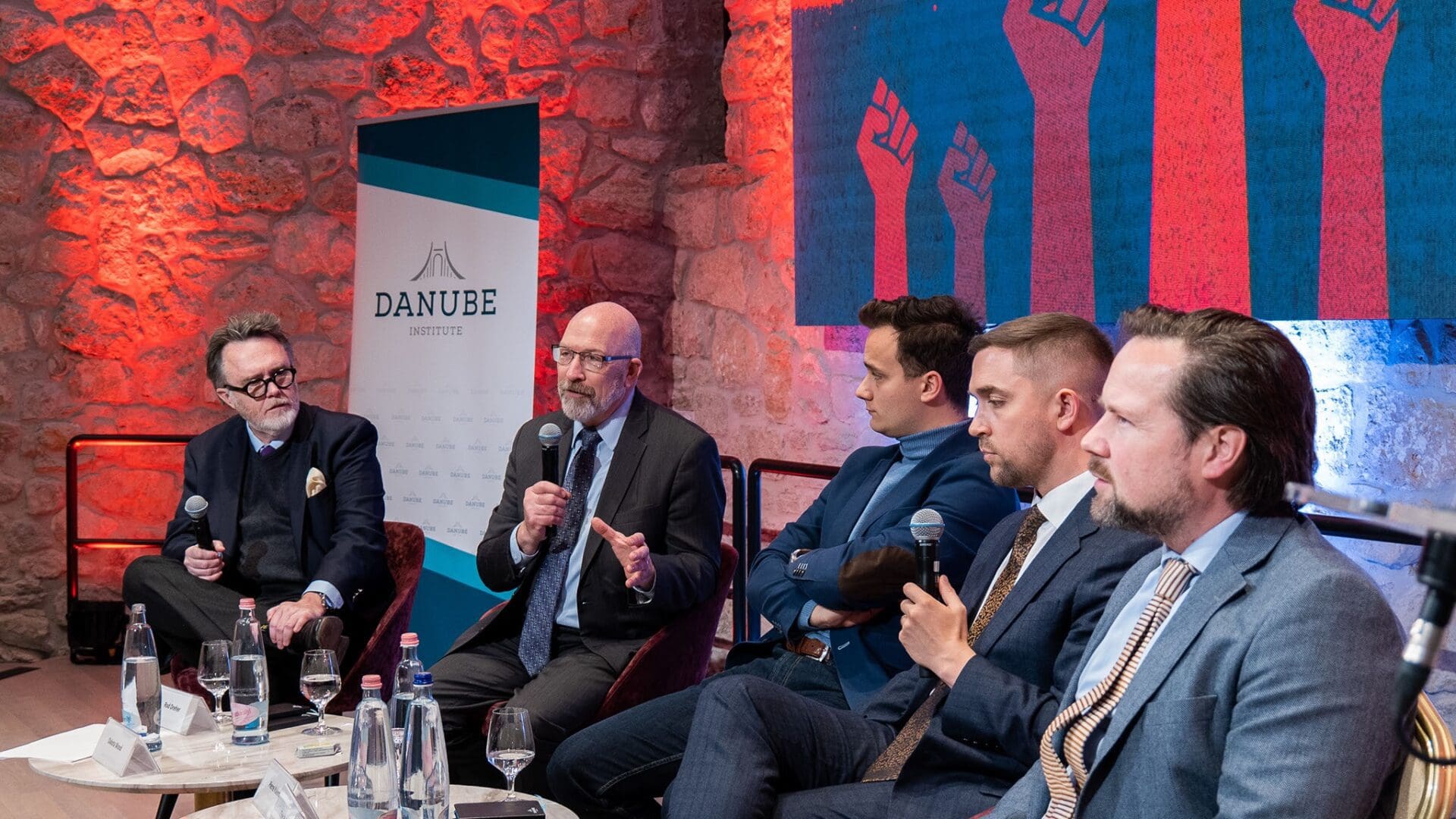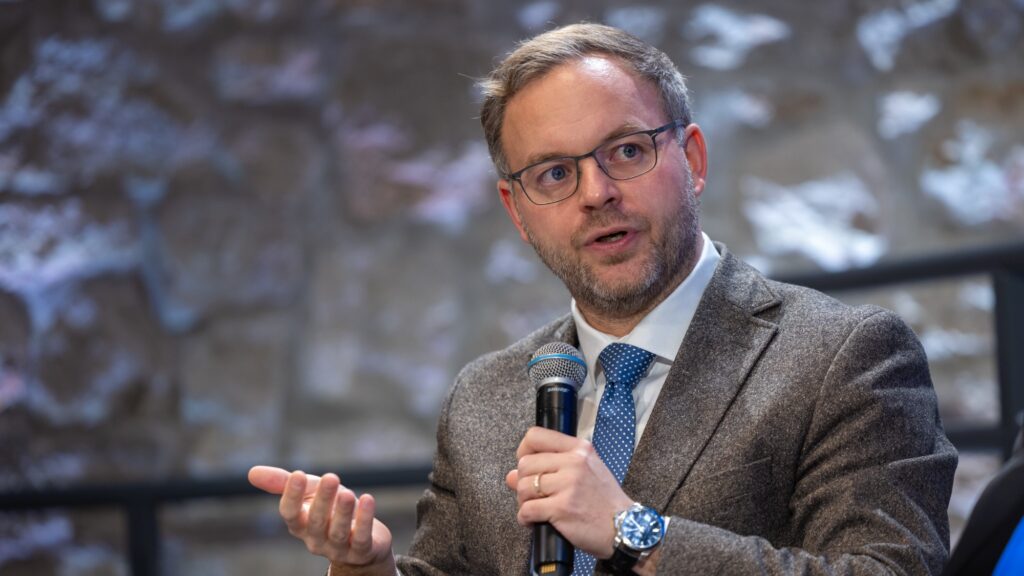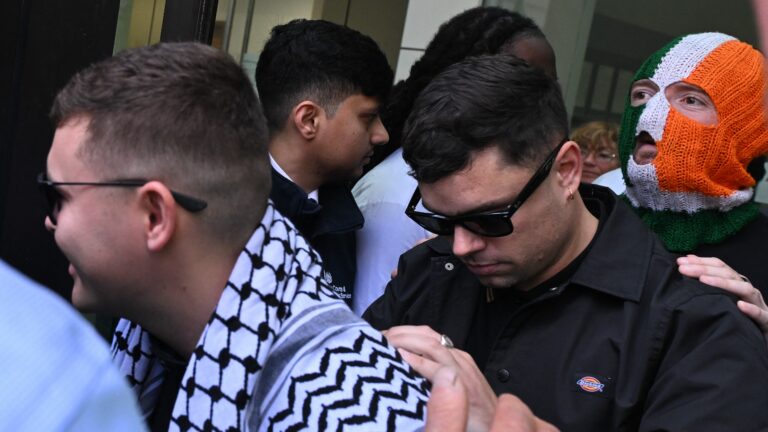The Danube Institute hosted an all-afternoon discussion this Monday, 27 March about one of the most controversial topics of Western, especially American, politics: critical race theory. A whole slate of excellent academics, writers, and government officials stood up to say their peace about the neo-Marxist ideology so prevalent in US academia and media, and alas, increasingly in Europe as well. The event was held in the Theatre Room of the Lónyay-Hatvany villa, located in the historic Castle district of Budapest.
Danube Institute President John O’Sullivan greeted the many in attendance with a short speech. He pointed to a problem that the speakers following him also alluded to a few times: that ‘wokeness’, an umbrella term encompassing critical race theory (CRT) and many other, recent left-wing ideologies, is hard to define. Due to its unpopularity among the general public, some leftist actors use its elusive nature to deny its whole existence, so they can dismiss it as a threat to the public. Mr O’Sullivan, however, is fully aware that wokeness is very real, although he does concede that it is hard to define. He believes that critical race theory, gender theory, belief in a climate emergency, and ESG theory (the belief that investments should be directed towards social and environmental causes, rather than shareholder value), although not logically connected, all make up the overreaching idea of ‘wokeness’. It is the first one of these theses, critical race theory that was the focus of the afternoon of discussion.
Chris Rufo, visiting fellow at the Danube Institute and senior fellow at the Manhattan Institute was the first guest speaker to take the stage. He pointed out the odd chain of events through which
critical race theory, clearly derived from European Marxist tradition, got popularised in academia in the US,
and is now being exported back to Europe.
Mr Rufo said he credits Derrick Bell, a former civil rights lawyer and Harvard professor, as the earliest proponent of the detested ideology. He was the one who first made efforts to push in American university circles what Mr Rufo calls ‘racial pessimism’, an idea that calls for a ‘revenge society’, as opposed to the ‘equality society’ sought after by the civil rights movements of the 1960s.
Mr Rufo also highlighted that while traditional Marxism made the struggles of the working class its focus, the neo-Marxist CRT is purely race-focused, thus making the white working class, originally an oppressed class in Marxist thought, the oppressors. Yes, all white people are considered racist and oppressive in this worldview, just as the United States is a racist country built on racial oppression. It is also generally against capitalism and the traditional two-parent family, as the speaker described it.
He also pointed out a unique feature that distinguishes CRT from other political philosophies: it is not interested in governing. Rather, it is content with existing outside the legislative process, and occasionally exercising its will on the status-quo system through a decentralised method of control. Guilt is the primary weapon it uses to achieve its aims, as in guilting people into feeling ashamed for what their racial group has one in American history. Mr Rufo also issued a warning to his audience listening in Budapest, Hungary: just because CRT would not fit in the Hungarian historical context, does not mean it cannot be successfully propagated here. It’s not a theory that is overly concerned with logical consistency.
Balázs Orbán on Twitter: “🇭🇺🤝🇺🇸Pleasure to meet @realchrisrufo today, who will be spending a month in #Budapest as a visiting fellow of @InstituteDanube. Welcome to #Hungary, Chris! pic.twitter.com/cc5QJ6260c / Twitter”
🇭🇺🤝🇺🇸Pleasure to meet @realchrisrufo today, who will be spending a month in #Budapest as a visiting fellow of @InstituteDanube. Welcome to #Hungary, Chris! pic.twitter.com/cc5QJ6260c
Renowned professor of sociology and head of MCC Brussels Frank Furedi was next to speak. He took issue with the phrase itself, arguing that critical race theory is not really a theory in the scientific sense, but rather a cultural movement or a narrative. Either way, it has a nefarious goal: devaluing Western culture. According to CRT, Thomas Newcomen did not just invent the atmospheric engine in 1712 which brought about the industrial revolution, he invented a ‘racist team engine’. He also talked about its fatalistic, deterministic view on race:
avid proponents of the theory also believe that skin pigmentation defines most of a person’s characteristics and experiences.
Amsterdam City Councilman Diederik Boomsa talked about how in his city, art grants now depend on racial representation. Meanwhile, founder of The Daily Skeptic and General Secretary of the Free Speech Union Toby Young, who joined us via a Zoom call from the United Kingdom, lamented the fact that while critical race theory is being exported from the US to his home country, they do not have a First Amendment giving more protection to the dissenters. He also drew attention to another disadvantage British anti-CRT advocates have compared to their American counterparts: unlike in the US, school boards are not elected in the UK. He he went on to mention that while the Education Act of 1996 prohibits overtly political messaging to be taught in schools, the provision in new Department of Education guidelines which designates anti-racism advocacy as an apolitical issue is being exploited by far-left ideologues in the school system.
Next, we had another guest join via a Zoom video call, Francesco Giubilei from Rome, Italy, who currently serves as an advisor to the Minister of Culture in the current conservative Giorgia Meloni administration in Italy. Mr Giubilei, who is also the president of the Tatarella Foundation, opened his piece with some optimism, saying that the Italian public as a whole is more conservative than the European average and thus less susceptible to the ‘power’ of CRT. He attributes this to the influence of the Catholic church, which is still greater (although diminishing) than in other European countries, as well as left-wing Italian political parties being less willing to take direction from abroad, specifically from the United States. Alas, this latter factor is likely to be changing soon, as the new secretary of the Italian Democratic Party, Elly Schlein, worked on both of President Barack Obama’s campaigns, and is likened to far-left New York Representative Alexandria Ocasio-Cortez in the US Congress by Mr Giubilei.
He went on to talk about uniquely Italian issues about wokeness. Such as the fact that left-wing activists in his country
are looking to ban the teaching of the ancient Latin language at universities, as it is the language of the Roman Empire, which had slavery;
or right-wingers often being compared to the fascism of Italian dictator Benito Mussolini, despite his starting his political career as a Marxist journalist.
Writer Pierre Valentin from France, a frequent contributor to Le Figaro and charismatic public speaker, took the stage next, live in Budapest this time. He referred back to the original problem raised by the opening speaker, Mr O’Sullivan, which is the hard-to-define nature of wokeism. So, Mr Valentin provided a definition of his own, saying that wokeism is
‘An ideology which perceives Western societies as fundamentally ruled by structures of oppression, hierarchies of domination, and systems of power, which negatively affects, whether voluntarily or not, its theorisingly Other, with a capital O, i.e. various minority figures, whether they be a sexual, religious, or ethnic minority, though often invisible means.
Furthermore, the woke are those who make it their lives’ goal to awaken others to this terrible state of affairs by attracting attention, raising awareness, and performing social activism, such as publicly shunning those who appear to deviate from this cult.’
He also spoke of the fact that France is perceived as a country more or less immune to the ‘woke virus’, with a centrist Macron presidency. For example, in 2021, Minister of Education Jean-Michel Blanquer took the leading role of the think tank Le Laboratoire de la République explicitly aiming to counter wokeism. However, as a result, he did not retain his position in the second Macron administration. Also, the so-called ‘inclusive writing style’ is sadly gaining ground in France, as Mr Valintin pointed out. This new linguistic movement seeks to ‘remedy’ the gendered nature of the French language. The George Floyd protests and riots during the summer of 2020 in US cities accelerated the popularisation of woke ideas in France—this time of recent history was referenced by multiple other speakers at the event as a catalyst for the international spread of CRT.
Rod Dreher on Twitter: “Amazing debut by @Valent1Pierre at our CRT conf today. Pierre Valentin is a strong new voice on the French Right whose words deserve to be heard far beyond France. Audience buzz after his talk was, “Who *is* this guy?!” I overheard a man offer him job in Brussels on the spot. pic.twitter.com/n4Q8ePTpGL / Twitter”
Amazing debut by @Valent1Pierre at our CRT conf today. Pierre Valentin is a strong new voice on the French Right whose words deserve to be heard far beyond France. Audience buzz after his talk was, “Who *is* this guy?!” I overheard a man offer him job in Brussels on the spot.
Dakota Wood, a defence expert at The Heritage Foundation and retired US Marine Corps officer, focused his speech on the detrimental effects of critical race theory within the United States military. Author-columnist Rod Dreher mainly spoke about what organised religion in the US can do to combat critical race theory. He also characterised CRT as ‘anti-Christian’, and emphasised the crucial difference between ‘Christian social justice’ and ‘Marxist social justice’.
After the last speech concluded, a short Q&A section followed. This part revealed that the panellists unanimously prefer Florida Governor Ron DeSantis as next year’s Republican presidential candidate over Former President Donald Trump. However, those who spoke on the subject concurred that it is up to the primary voters to decide, and they are willing to back whoever the winner is (presumably) against incumbent President Joe Biden in the presidential election in 2024.








